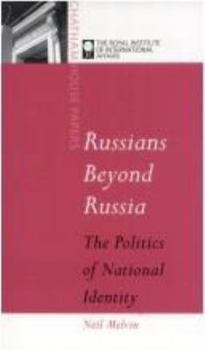Russians Beyond Russia
This work provides an examination of the political issues surrounding the fate of ethnic Russians who, since the beginning of 1992, have found themselves living in non-Russian nation-states. Analysis focuses on three areas: relations between expatriate Russian-speaking communities and their host populations; the impact of expatriate issues on Russian domestic politics, such as the sensitive issue of the Crimea; and the role of the new Russian diaspora in relations between the states of the former Soviet Union. Detailed case studies are provided of the development of a national identity within the Russian-speaking communities of five Soviet Republics: Estonia, Latvia, Moldova, Ukraine and Kazakhstan.
Format:Paperback
Language:English
ISBN:1855672332
ISBN13:9781855672338
Release Date:April 1998
Publisher:Pinter Publishers
Length:176 Pages
Weight:0.59 lbs.
Dimensions:0.5" x 5.3" x 8.5"
Customer Reviews
1 rating
A study of the Russian diaspora in the 'near abroad'
Published by Thriftbooks.com User , 26 years ago
Reviewed by NIGEL CLIVE in International Relations, Volume XIII, No 2, August 1996 - Neil Melvin's valuable study of the role of the Russian-speaking communities in the development of national identity in six former Soviet republics grew out of a project organized by the Royal Institute of International Affairs. In each case, Melvin has provided the historical background to the contemporary problems. Within the Russian Federation, the Russian national question is of fundamental importance, because in certain areas, of which Chechenia is the best known, Russians constitute a minority. The disintegration of the USSR created a situation in which some 25 million Russian settlers found themselves living in newly independent states. The consequent notion of a Russian diaspora was integrated into the definition of the Russian nation. It was only with the Gorbachev reforms of the 1980s and the rise of nationalist politics that Russian identity began to undergo significant change. After the collapse of the USSR, the leading members of the democratic bloc, led by Yeltsin and his Foreign Minister Kozyrev, claimed that interference in the internal affairs of neighbours belonged to the imperial and Soviet past. But by the winter of 1992, the democratic defence of the settler communities had become a basic tenet of Russia's external and domestic policies. In his 1994 New Year address, Yeltsin described the diaspora as `inseparable from us', but by the early summer this line was being toned down. In the Baltic states, each republic has followed different approaches to the settler communities. In Estonia, the official line has shown willingness to support the cultural and political development of the non-Estonian community, while Latvia has been the most extreme case of Sovietization. However, from 1989 to 1991, the Russian-speaking populations in both states demonstrated increasing support for Baltic independence. The defeat of the August 1991 coup in Moscow caused many leading Latvian politicians to encourage non-Latvians to leave, and in the June 1993 elections the nationalist parties were easy winners while most of the Russian-speaking population were unable to vote. In Estonia, the Russian settlers developed as a far more integrated community, notably in the north-east. Indeed, the integration of non-Estonians was further accelerated by the parliamentary elections in early 1995. In contrast to Latvia where a requirement to work in the bureaucracy is fluency in Latvian, Estonians have built important bridges with their Russian speakers. The final military withdrawal in August 1994 signalled Moscow's commitment to independent Baltic states. Romania and the Russian Federation have had territorial and diaspora claims on Moldova. Six days after the Moldovan declaration of independence on 27 August 1991, the five districts on the left bank of the Dniester declared a separate independence in the Moldovan Transdniestrian Republic (the PMR). The PMR then formed the






